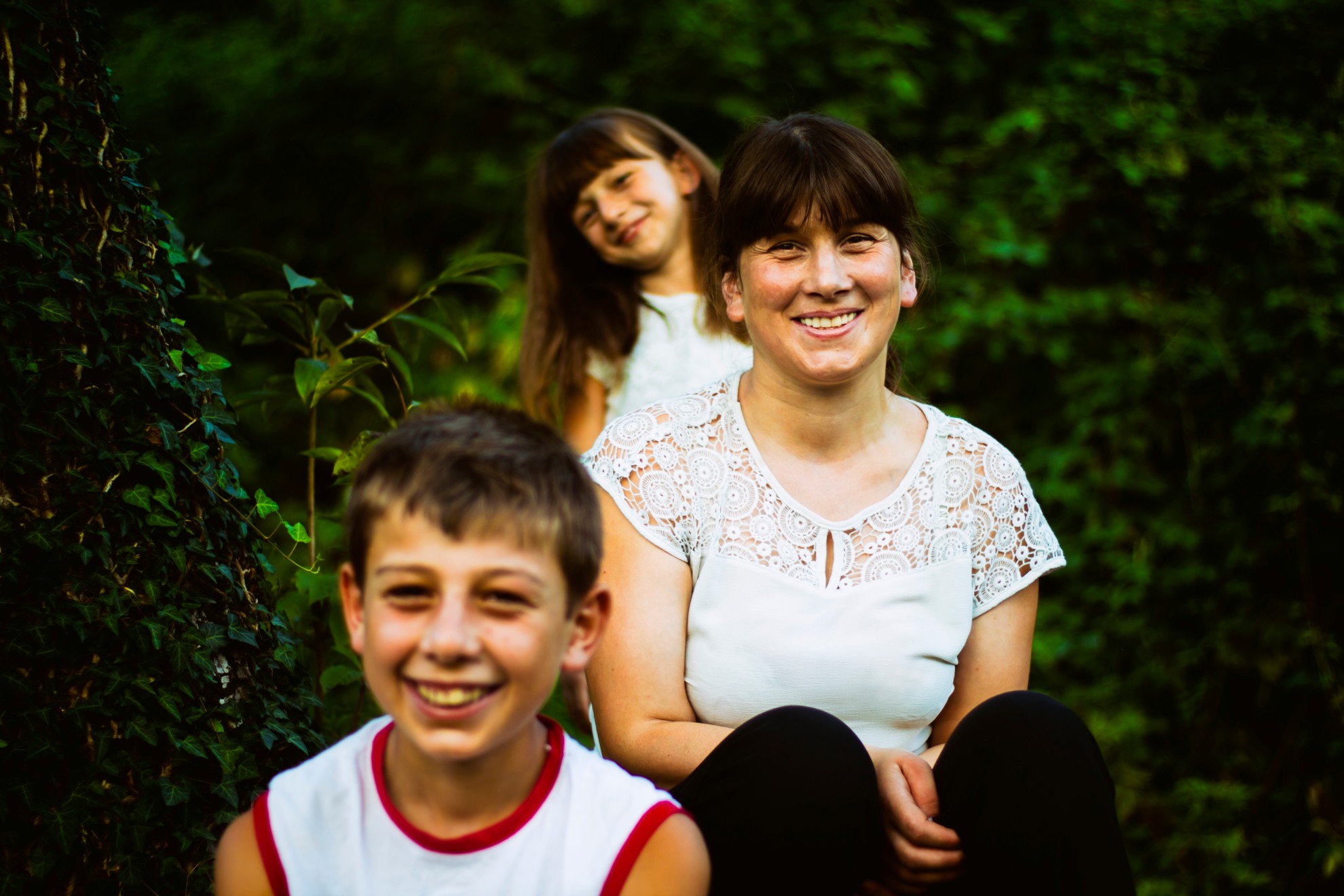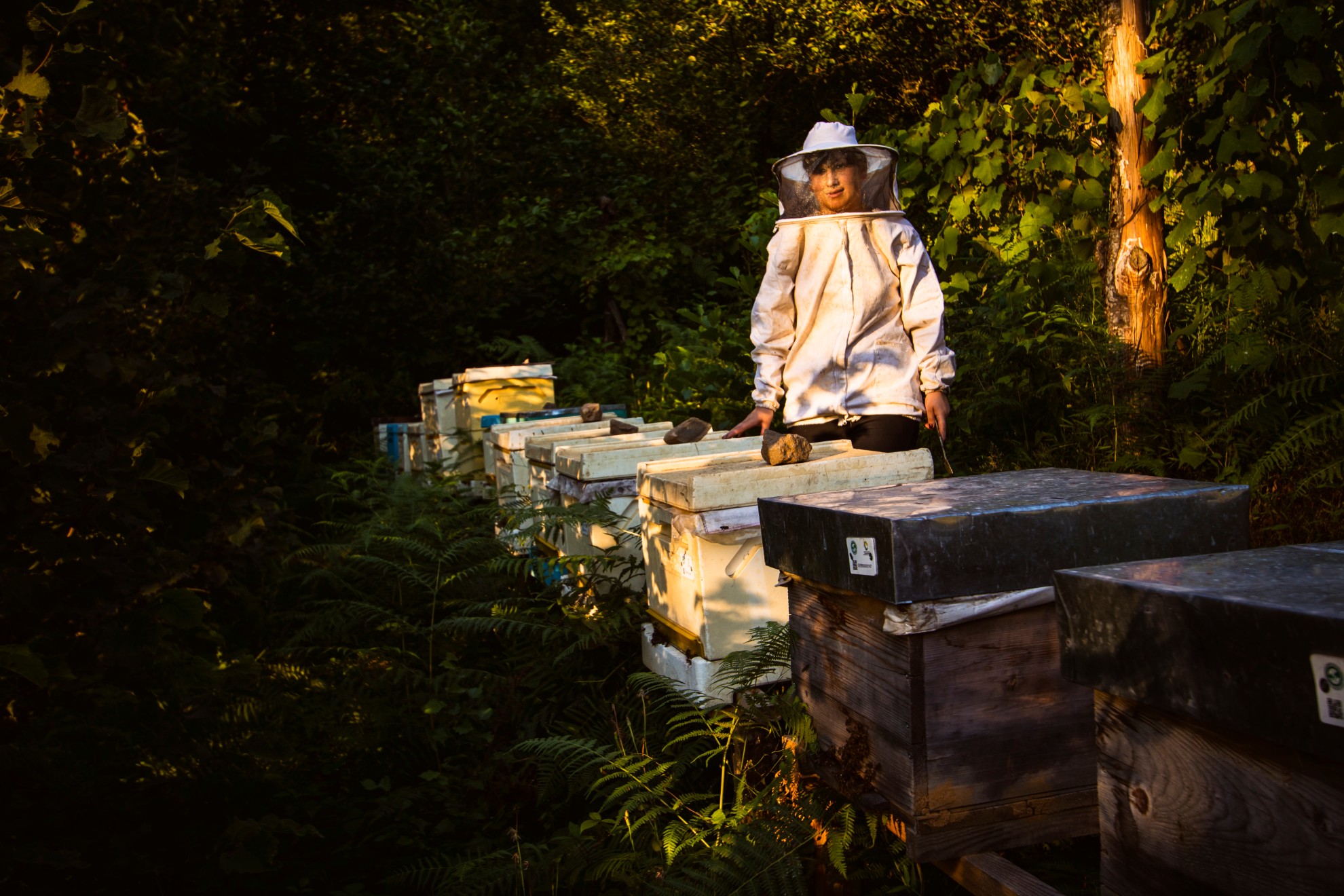Manana Bolkvadze, 31, Batumi/Tsalka
“Every morning before I go to school to give a lesson, I sit on the beach, observe the movement of waves and think about the dreams I have achieved and the dreams I will definitely achieve in the future.”
“They Got Me Engaged When I was 13”
“Our family moved from Khulo to Tsalka due to a landslide. A day wouldn’t pass without a “matchmaker” coming to our house to ask my hand in marriage. I was no longer able to leave the house. My father got me engaged to the oldest and the most dignified man for my own safety. At first, I liked it when people came to my house with sweets and new clothes. I was in 9th grade at that point. It was in 10th grade when my mother forbade me to read books – this was when I actually realized that early marriage would do me no good. “You’d better learn to do household chores”, she said, “Don’t make me ashamed of you when you go to a new family”. Daddy was a teacher and the only person in our family who supported me getting an education. When he was at home I was allowed to sit like a queen and read books. Even my fiancé told me once that I was wasting my time and books would not do any good in the household. Of course, I protested my engagement because I could feel the threat of losing my freedom with this person. However, my protest proved to be powerless. I was in 11th grade when my fiancé kidnapped me for marriage. I remember daddy’s cousin, the head of the police department at that time, coming to us the day after. I was hoping that they would return me home. Instead he advised me not to upset my father and not to ask him to take me back. He said my father would be crestfallen for the rest of his life because of me; he would have a daughter under his roof who returned home after being kidnapped for marriage. This man had such a strong effect on me that I could not utter another word and I told my father that I was staying there out of my own will. That’s how I got married.”
“I realized that life without education would be hard for me”
“After graduating from high school, I intended to continue my studies. I spent a whole year studying hard and preparing for the university entry exams. However, in the final days I was confronted with resistance from my husband’s family; they thought I should have postponed exams for the following year since I was pregnant at that time. My parents had already moved back to Adjara. I remember daddy calling me to say hello shortly after that. I told him I wasn’t taking the exams that year because of my pregnancy. I was crying quietly on the phone. I knew there would be no such thing as “next year”, the child would be born, I would become involved in a new routine and I would not be able to continue my studies. Soon the bridge near Choloki was blown up. Daddy came to see me in Tsalka the next day. Turns out he crossed Choloki on foot to take me to Tbilisi for the entry exams. We could not make it in time for the exams. It was my father again who contacted the Ministry of Education, explained my situation to them and they rescheduled the exam just for me. That’s how I became a student at the faculty of pedagogy at the Ilia Chavchavadze State University. “
 In the Herd
In the Herd
“After graduation I started to teach civic education and geography in Gumbati, a village in Tsalka. I already had two children at that time and we were starting to have financial difficulties. My parents-in-law were both ill, my husband was unemployed and my salary wasn’t enough for anything. That’s why we decided to herd the village cows, about 500-600 of them, for additional income. We had to move to the mountains with tents. Imagine me living in a tent for months – I was the first to wake up in the morning, I took care of the elderly, milked the cows, made cheese, made dinner, took care of the children, went to school and went herding once a week. I used to take kids with me to herd. In addition to that, I had to go to the village, which was 8 kilometres away from our tents, every day to take care of the household. I had to learn to ride a horse to get faster to unpaved places. I used to ride a horse to school as well – I tied it near the house, changed, attended teacher council meetings and then went back on horse. I lived like that for 3 years. “
In the Beehive
“During the time we lived in the mountains, we got a new neighbour – a beekeeper who came up there with his beehives. That was when I first got interested in beekeeping. I got the chance to spend 2-3 hours a day in a beehive to learn everything, obviously, with the help of our new neighbour. I spent two years mastering this new pursuit in practice. This experience made me realize that I had to start a new business – beekeeping.
One day there was a meeting in Tsalka of the representatives of Ministry of Agriculture on the matters of cooperatives. I heard about it by chance and jumped on my horse immediately to get to Tsalka in time for the meeting. That’s where I spoke about my new business idea for the first time –in order to bring it to life it was necessary to create a cooperative of beekeepers. I attended a training session in Tbilisi, got to know the legislation and the system of bee-keeping and started looking for members of the cooperative. I had my mind made up from the start: I wanted women to join. My heart aches for the women from rural areas who get especially oppressed. Unfortunately, they don’t even know that they have countless opportunities. If you ask them what they do they will say that they do nothing when in reality they do so much work on a daily basis… Being secondary human beings and depending on their husbands is so deeply imprinted on women’s consciousness that they don’t believe in their own abilities. At first, the cooperative consisted of 3 women – my mother, my childhood friend and me. We received 50 beehives and 20% was co-funded. I kept empty beehives in my yard for a year. That’s how I established a business-oriented beekeeping cooperative.
 At first they laugh at you, Then they acknowledge you
At first they laugh at you, Then they acknowledge you
Villagers and family members used to make fun of me and criticize me. They said women had no place in business. They looked at empty beehives and made fun of me… I slowly started writing projects while I also studied developing business plans and we won several projects in a year: we purchased bee families, inventory, and started to expand. There currently are 19 women who are members of our cooperative. There are women from Samtredia, Marneuli, and Batumi among them. We have 405 bee families in total and we produce honey according to the same standard. We also received a quality certificate from Estonia. We try to produce organic honey. I developed an experimental project within which I manufacture a plant-based medicine against bee diseases and test them. I’m currently testing a particular kind of a plant-based medicine. We went through two seasons with it successfully and if it goes well this winter I am going to make the recipe public.”
A new stage – living alone
“I left Tsalka and went back to my parents in Adjara. After 15 years I realized that I had not created anything valuable while being with my husband. I always knew I could do more but unfortunately, I had no support from him. I matured and developed significantly. I helped local farmers with writing business plans, I won grants, I was looking to export and he didn’t stand by me in any of these endeavours, on the contrary, he was always an obstacle. We had no shared interests or dreams any more. That’s why I decided to take care of myself and my children independently and move forward.
I would never have managed to leave my family without my formal education. My father thinks he made a huge mistake when he got me engaged at an early age. He worries a lot about it and tries to fix his mistakes by standing by my side and helping me to move forward.
Apart from giving lessons in civic education in two schools of Batumi, I get additional income from writing projects and I also give private lessons in geography. I was enrolled in a master’s program this year. I will study oenology (wine production). I developed a technology to produce wine from honey and I plan to produce honey-based wine for export in the future.
Not long ago I got invited to teach beekeeping at Batumi University. To me this was a big acknowledgement of my work.
The more successful I am, the more I can do for my children. I will have more means to support their education, development, and they won’t have to go through what I went through.”
Author: Maiko Chitaia
Photo: Nino Baidauri
Translation: Ani Gogberashvili

